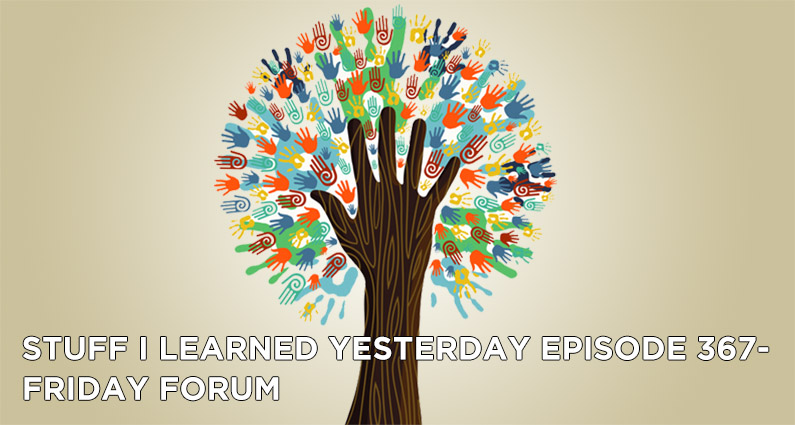Podcast: Play in new window | Download (Duration: 18:02 — 8.9MB) | Embed
Welcome to Stuff I Learned Yesterday. My name is Darrell Darnell, the mashed potato cheesy bacon balls I made for Thanksgiving were as delicious as they sound, and I believe that if you aren’t learning, you aren’t living. In today’s episode of Stuff I Learned Yesterday I’m pleased to bring you another installment of the Friday Forum.
Today’s Fun Fact: Today, the Friday after Thanksgiving is often referred to as “Black Friday.” Do you know where this moniker originated?
The earliest known use of “Black Friday” in such a context stems from 1951 and referred to the practice of workers calling in sick on the day after Thanksgiving in order to have four consecutive days off (because that day was not yet commonly offered as a paid day off by employers): “Friday-after-Thanksgiving-itis” is a disease second only to the bubonic plague in its effects. At least that’s the feeling of those who have to get production out, when the “Black Friday” comes along. The shop may be half empty, but every absentee was sick — and can prove it.
What to do? Many companies have tried the standard device of denying Thanksgiving Day pay to employees absent the day before and after the holiday. Trouble is, you can’t deny pay to those legitimately ill. But what’s legitimate? Tough to decide these days of often miraculously easy doctors’ certificates.”
By 1961 the term “Black Friday” (and “Black Saturday” as well) was being commonly used in a derisive sense by Philadelphia police, who had to deal with the mayhem and headaches caused by all the extra pedestrian and vehicular traffic created by hordes of shoppers heading for the city’s downtown stores on the two days after Thanksgiving.
In a 1994 article, former Philadelphia Bulletin reporter Joseph P. Barrett recalled how he took part in popularizing the term “Black Friday” throughout Philadelphia in the early 1960s, from which it eventually spread into nationwide usage: “The term “Black Friday” came out of the old Philadelphia Police Department’s traffic squad. The cops used it to describe the worst traffic jams which annually occurred in Center City on the Friday after Thanksgiving.
It was the day that Santa Claus took his chair in the department stores and every kid in the city wanted to see him. It was the first day of the Christmas shopping season.
Schools were closed. Late in the day, out-of-town visitors began arriving for the Army-Navy football game.
Every “Black Friday,” no traffic policeman was permitted to take the day off. The division was placed on 12 hours of duty, and even the police band was ordered to Center City. It was not unusual to see a trombone player directing traffic.“
All of these origin stories are new to me. I spent nearly years of my life in the retail world, and this final story is the one I was always told.
Many merchants objected to the use of a negative term to refer to one of the most important shopping days in the year. By the early 1980s, an alternative theory began to be circulated: that retailers traditionally operated at a financial loss for most of the year (January through November) and made their profit during the holiday season, beginning on the day after Thanksgiving. When this would be recorded in the financial records, once-common accounting practices would use red ink to show negative amounts and black ink to show positive amounts. Black Friday, under this theory, is the beginning of the period when retailers would no longer have losses (the red) and instead take in the year’s profits (the black). The earliest known use that presents the “black ink theory” appeared in the edition of November 28, 1981 of the Philadelphia Inquirer:
If the day is the year’s biggest for retailers, why is it called Black Friday? Because it is a day retailers make profits—black ink, said Grace McFeeley of Cherry Hill Mall. “I think it came from the media,” said William Timmons of Strawbridge & Clothier. “It’s the employees, we’re the ones who call it Black Friday,” said Belle Stephens of Moorestown Mall. “We work extra hard. It’s a long hard day for the employees.” (Info from Snopes and Wikipedia)
Friday Forum
Today is the Friday Forum!! I’m Darrell Darnell, and in today’s episode of Stuff I Learned Yesterday I share Friday Forum contributions from Barb, Bonita, and Hannah. You can participate in the Friday Forum by visiting our Feedback Page or calling our voice feedback line at 304-837-2278.
Join our SILY Facebook group and let’s get to know one-another!
I’m Darrell Darnell and this has been stuff I learned yesterday.
Follow Golden Spiral Media on Twitter at GSMPodcasts and Facebook.com/GoldenSpiralMedia. To subscribe to Stuff I Learned yesterday, visit GoldenSpiralMedia.com/subscribe. If you’ve enjoyed this episode of Stuff I Learned Yesterday, I would be grateful if you’d leave a review in iTunes.
[sc:stuff]
